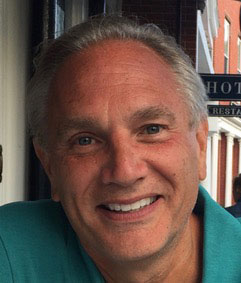
Jay Ritzen
By: Kim Mailes, American Red Cross
One of the most difficult assignments for an American Red Cross volunteer is to stand by the side of those enduring a mass casualty event. A few months ago, Red Cross Disaster Spiritual Care volunteer Jay Ritzen received the call to respond as quickly as possible to a transportation disaster that resulted in several fatalities and a host of traumatized survivors.
“I look at myself as a wounded healer who tries to provide a safe place to help comfort a client who’s had a traumatic experience,” Jay said.
Serving others in the face of disaster is a second career for Jay after a long corporate career. Nearing retirement, he began contemplating the best way to reinvent himself for the next chapter. “When I was in college, I was a fireman, a rescue squad member, and an EMT. And I wanted to merge those experiences with my spiritual journey. I found my focus and passion in trauma chaplaincy,” Jay said.
He has deployed to Red Cross relief operations in Louisiana and New Jersey, providing disaster spiritual care in shelters for those who had been displaced by hurricanes, fires and tropical storms. When not deployed to national operations, he volunteers as a St. Louis county police chaplain and is a member of the Missouri-Arkansas Region Red Cross Disaster Action team, providing after-incident support for those who have suffered home fires and other traumatic events.
“When interacting with those affected by disaster, I concentrate on providing a compassionate presence, bearing witness, and offering hope,” Jay said. “I’m sure they see me in a different light than talking with a family member or a friend as they are more comfortable conveying things to me that might not be as easy with someone else. I try to create a calming environment that allows them to feel safe and reduce anxiety, and to walk with them in processing their trauma. Maybe it’s anger, or sadness, or frustration—a whole host of emotions. It’s all a personal journey because there is no right or wrong way for them to find meaning in what they’ve been through.”
During the recent transportation disaster, Jay counseled an individual so traumatized they could not board a plane to journey home. They had arrived at the airport several times, but could not summon the will to actually board the plane.
“I’m not an expert,” said Jay. “I’m just serving God and the Red Cross. I spoke with this individual in a calm tone and deescalated their fears. I encouraged them to practice simple breathing exercises to mitigate their anxiety swings and to create a new, more joyful picture in their mind: their apartment, their bed, their kitchen, their family greeting them upon arrival — in an attempt to visualize a safe and comfortable destination that would make boarding the plane home a more positive and motivating experience, bringing them closer to a better place and helping to minimize the trauma visuals in their mind. By God’s grace, they were able to get on the plane and arrive home safely and comfortably.”
The American Red Cross mission is to alleviate human suffering in the face of disaster through the power of volunteers. When a hurricane strikes or a wildfire races through a community, media coverage publicizes the rapid Red Cross response as safe shelters are set up and emergency response vehicles begin distributing food and emergency supplies to devastated neighborhoods.
But disasters and volunteers come in other forms. In the wake of disasters such as a horrific school shooting or a mass casualty transportation incident, the Red Cross quietly assumes a reactive posture, supporting the victims, their families and the heroic first-responders. Red Cross disaster spiritual care is an integral part of this reactive emergency response.
“I’ve always said that I receive more than I give, which is sometimes difficult for me to understand” Jay said. “The bulk of my work as a chaplain seems to happen on the worst day of an individual’s life, so I see myself as a spiritual paramedic.”
“I’ve been placed in their path to help them find comfort. If I’ve been able to achieve that in some small way, at least for a small period of time, then maybe I’ve bridged them to that next person who will take them on their next step. One foot in front of the other.”
Support all the urgent humanitarian needs of the American Red Cross.
Find a drive and schedule a blood donation appointment today.
Your time and talent can make a real difference in people’s lives. Discover the role that's right for you and join us today!